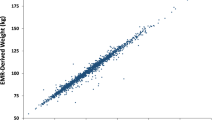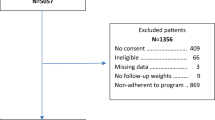Abstract
Background/objective:
Information on weight loss is used in screening and assessment tools. It is essential that the data are correct. Anamnestic data of weight changes were compared with records for hospitalized patients and outpatients.
Subjects/methods:
For hospitalized patients, anamnestic and recorded weight data were obtained. For outpatients, data of weight changes since last visit were obtained.
Results:
Of 34 hospitalized patients, 21 stated change of weight (15 lost, 6 gained). Weight loss in 9 and weight gain in 12 patients were recorded. Ten patients stated no change of weight. Weight loss in 4 and weight gain in 3 patients were recorded. Of 15 patients who stated weight loss, it was correct for 9 patients. Six of 21 patients stated weight changes opposite the records. Of 43 patients, 14 stated weight changes before admission; only 9 could indicate the time span. Ten patients stated ‘Do not know’ to the question of weight changes. For 156 outpatients, 86 stated change of weight (39 lost, 47 gained). Weight loss in 42 and weight gain in 47 patients were recorded. Fifty-eight patients stated no change of weight. Weight loss in 26 and weight gain in 29 patients were recorded. Of 38 patients who stated weight loss, it was correct for 31. Seventeen of 85 patients stated weight changes opposite the records.
Conclusions:
Recollection of weight changes is poor for a large percentage of patients. In patients who stated weight loss it was only correct for 75%, and for patients who stated unchanged weight 25% have lost more than 1 kg. Thus, incorrect weight loss data can cause over- and underestimation of nutritional risk.
This is a preview of subscription content, access via your institution
Access options
Subscribe to this journal
Receive 12 print issues and online access
$259.00 per year
only $21.58 per issue
Buy this article
- Purchase on Springer Link
- Instant access to full article PDF
Prices may be subject to local taxes which are calculated during checkout


Similar content being viewed by others
References
Kondrup J, Allison SP, Elia M, Vellas B, Plaut M . ESPEN guidelines for nutrition screening 2002. Clin Nutr 2003; 22: 415–421.
Marton KI, Sox HC, Krupp JR . Involuntary weight loss: diagnostic and prognostic significance. Ann Intern Med 1981; 95: 568–574.
Baker JP, Detsky AS, Wesson DE, Wolman SL, Steward S, Whitewell J et al. Nutritional assessment. A comparison of clinical judgment and objective measurements. N Engl J Med 1982; 16: 969–972.
Detsky AS, Baker JP, Mendelson RA, Wolman SL, Wesson DE, Jeejeebhoy KN . Evaluating the accuracy of nutritional assessment techniques applied to hospitalized patients: Methodology and comparisons. J Parenter Enterel Nutr 1984; 8: 153–159.
Author information
Authors and Affiliations
Corresponding author
Ethics declarations
Competing interests
The authors declare no conflicts of interest.
Additional information
Contributors: Both authors contributed substantially to the study. JE wrote the manuscript, which was read and approved by SBS.
Results of the study were presented as a poster at the ESPEN congress, Rome, September 2008.
Rights and permissions
About this article
Cite this article
Eriksen, J., Sneftrup, S. Anamnestic weight loss—do patients remember correctly?. Eur J Clin Nutr 67, 607–609 (2013). https://doi.org/10.1038/ejcn.2013.65
Received:
Revised:
Accepted:
Published:
Issue Date:
DOI: https://doi.org/10.1038/ejcn.2013.65



